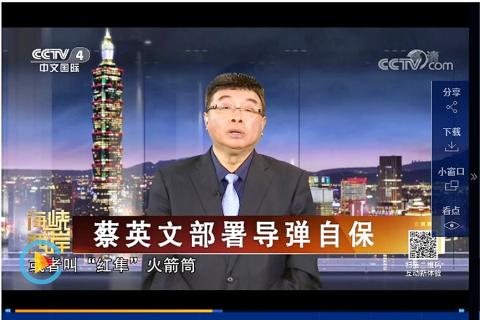New Party legislator-at-large nominee Chiu Yi (邱毅) has been called a “traitor” on social media after appearing on Chinese television twice over the past week discussing Taiwan’s military defense systems.
Appearing on China Central Television (CCTV) political talk show The Two Sides of the Strait (海峽兩岸), Chiu discussed the navy’s Kao Hsiung LST-542-class tank landing ship, its missile and radar systems, as well as the military’s missile deployments in Taipei.
Speaking on the program on Friday, Chiu said that the Military Police Command’s deployment in October of Kestrel missiles at key government buildings in Taipei was ordered by President Tsai Ing-wen (蔡英文) out of fear of a “decapitation strike” by the Chinese People’s Liberation Army (PLA).

Photo: screen grab by Chung Li-hua, Taipei Times
Government reports calling the Kestrel missiles “anti-tank missiles” were an exaggeration, Chiu said.
The Kestrel would be incapable of piercing the armor of China’s Type 98 and Type 99 tanks, he said.
However, the missiles — which were developed by the Chungshan Institute of Science and Technology — would be effective against light tanks or armored vehicles, he said.
While reports said the missiles would help defend government institutions, they were intended to protect only the president, and would be used for the defense of the Presidential Office Building and Tsai’s official residence, he said.
This is further evidenced by the formation of the Quick Reaction Company at the 202nd Military Police Command Headquarters in Taipei, the commander of which is a woman, Chiu said.
Appearing on the program again on Sunday, Chiu said that while the Kao Hsiung has a phased array radar system and a vertical launching system — which are standard equipment on destroyers worldwide — the systems aboard the Kao Hsiung are outdated.
Taiwanese media have reported on close US-Taiwan relations, with Washington helping Taipei with its indigenous shipbuilding program and providing technological assistance, which has become a bragging point for Tsai, Chiu said.
Tsai has been imploring the public to stand united against China and assuring them that the Taiwanese military can resist a PLA invasion, he said.
Both remarks are merely campaign promises ahead of the Jan. 11 elections, Chiu added.
The Ministry of National Defense yesterday said that Chiu’s actions should be “strongly discouraged” and advised the public against discussing or speculating about military deployments or adjustments, which the nation’s security depends on.
The public should keep in mind that the Chinese Communist Party has never renounced the use of force against Taiwan, it said.
The ministry has “absolute confidence” that it can protect the nation, it added.
Additional reporting by Aaron Tu

The US government has signed defense cooperation agreements with Japan and the Philippines to boost the deterrence capabilities of countries in the first island chain, a report by the National Security Bureau (NSB) showed. The main countries on the first island chain include the two nations and Taiwan. The bureau is to present the report at a meeting of the legislature’s Foreign Affairs and National Defense Committee tomorrow. The US military has deployed Typhon missile systems to Japan’s Yamaguchi Prefecture and Zambales province in the Philippines during their joint military exercises. It has also installed NMESIS anti-ship systems in Japan’s Okinawa

‘WIN-WIN’: The Philippines, and central and eastern European countries are important potential drone cooperation partners, Minister of Foreign Affairs Lin Chia-lung said Minister of Foreign Affairs Lin Chia-lung (林佳龍) in an interview published yesterday confirmed that there are joint ventures between Taiwan and Poland in the drone industry. Lin made the remark in an exclusive interview with the Chinese-language Liberty Times (the Taipei Times’ sister paper). The government-backed Taiwan Excellence Drone International Business Opportunities Alliance and the Polish Chamber of Unmanned Systems on Wednesday last week signed a memorandum of understanding in Poland to develop a “non-China” supply chain for drones and work together on key technologies. Asked if Taiwan prioritized Poland among central and eastern European countries in drone collaboration, Lin

BACK TO WORK? Prosecutors said they are considering filing an appeal, while the Hsinchu City Government said it has applied for Ann Kao’s reinstatement as mayor The High Court yesterday found suspended Hsinchu mayor Ann Kao (高虹安) not guilty of embezzling assistant fees, reducing her sentence to six months in prison commutable to a fine from seven years and four months. The verdict acquitted Kao of the corruption charge, but found her guilty of causing a public official to commit document forgery. The High Prosecutors’ Office said it is reviewing the ruling and considering whether to file an appeal. The Taipei District Court in July last year sentenced Kao to seven years and four months in prison, along with a four-year deprivation of civil rights, for contravening the Anti-Corruption

NO CONFIDENCE MOTION? The premier said that being toppled by the legislature for defending the Constitution would be a democratic badge of honor for him Premier Cho Jung-tai (卓榮泰) yesterday announced that the Cabinet would not countersign the amendments to the local revenue-sharing law passed by the Legislative Yuan last month. Cho said the decision not to countersign the amendments to the Act Governing the Allocation of Government Revenues and Expenditures (財政收支劃分法) was made in accordance with the Constitution. “The decision aims to safeguard our Constitution,” he said. The Constitution stipulates the president shall, in accordance with law, promulgate laws and issue mandates with the countersignature of the head of the Executive Yuan, or with the countersignatures of both the head of the Executive Yuan and ministers or